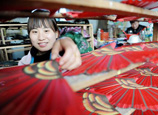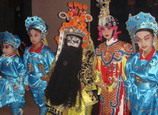
Recalling the English words marked on parts or logos of jeans she worked on, Tang Shuxiu, 53, once a model worker at Nanjing Turbine and Electric Machinery Group in Jiangsu Province, never thought her skills at work would one day be of use in a "reeducation through labor" center.
Tang was put into Jiangsu provincial labor reeducation center for women for a one-year stretch starting from April 6, 2011 after she kept petitioning to be given an apartment in Nanjing city center, as promised by her company.
"I still remember the screams of inmates at the center as they were beaten by older inmates who were drug traffickers. They sounded like frightened and wounded animals and their voices scared me to the bone," Tang said, describing how long-term inmates beat newcomers who slowed down on the assembly line.
She joined hundreds of women at the labor camp working day and night making jeans and toys.
According to the law, people who committed minor offenses can be sent to reeducation through labor centers without trial. But rules stipulate that they should have spent at least three hours a day learning regulations and rules but no more than six hours working.
Quotas to be filled
"There are around 40 people in one working unit, toiling on an assembly line to make goods for export. We needed to make about 900 pair of jeans a day, but according to the guards, they were only sold for slightly more than 3 yuan for each pair," Tang said.
Teng Xiaoming was 61 when he was put into Dalianshan labor reeducation center in Nanjing in November 2009. He didn't enjoy any favorable treatment for his old age and had to work until late at night to make up his daily quota of knotting bag laces.
His suffering was as a result of years of petitioning for more compensation after his 1,000-square-meter houses were demolished by local governments.
"It was hard for me to see sunlight during my days at the center. I got up around 5:30 am in the morning and worked at least until 10 pm every day," Teng told the Global Times, adding that he was often called to the workshop again during the night to finish his quota.
Lying in Jiangning district, just over an hour's drive from the center of Nanjing, Dalianshan labor reeducation center was established in 1970 and it currently has 135 employees. The center has three major sections, including dorms and factories for detainees, office buildings for police and a training center for guards.
Surrounded by walls over six meters high and fences equipped with surveillance cameras, the labor reeducation center keeps a veil of secrecy. The sound of patriotic songs being sung by inmates can be heard during breaks at noon or in the evening while the factory lights can be seen from a nearby hill until past 8 pm.
"I rarely saw them shut down operations early as we basically worked until 9 or 10 pm every day. Whenever there was an early shutdown, we cheered as if we were at a wedding banquet," said Li Long, a former detainee and now a free legal consultant for those put into labor reeducation centers or victims of forced demolitions.
Unmarked trucks can be seen driving out from the center but there were no sign of police officers outside, giving the center an eerie feeling during the day.
A man surnamed Zhu who lives near the center told the Global Times that he learned the center was producing shoes and tent canvasses for private businesses who not only put in orders with the center's authorities but would also sometimes visit the center to check up on their order.
Li Long kept an eye on who he was making these products for and found out from containers used to put the shoes in that they were made for the Yangzhou Hetai Plush and Carpet Industrial Corporation. But according to the information published on the company's website, it only produces carpets and rugs.
The information couldn't be confirmed by local authorities. But "Made in China" labels bearing number tags indicating that they were to be attached to textile shoe soles were found in a garbage dump behind the center.
"I remember these although I had no idea what was written on them. I used to glue them onto the shoes," Li Long said.
Dump them all
Li overheard a guard in the center telling him that officers in the city's public security bureaus also had a quota to fill every month. However, theirs didn't depend on stitching shoes together but on ensuring a steady supply of cheap labor to the camp to ensure orders were met.
According to the principles of labor reeducation, released in 1982, people such as "anti-revolutionaries" and those disrupting social order but not in a way serious enough to constitute a criminal charge would be sent to the labor camp.
But Xu Chuanzhu, 41, never thought she would become such a detainee.
Xu used to be a real estate agent in Nanjing but her life was turned upside down after she got into a debt dispute with one of her buyers in 2011. Xu's relatives attacked the buyer but a deal was struck to not pursue any further charges in October.
But a month later, six police officers in plainclothes claiming to be from the Houzaimen branch of Nanjing's Xuanwu district drove to her agency, hit one of her employees and took Xu into police custody on November 22, 2011 without a warrant, Xu said. She stayed in a detention center for 40 days without her cell phone. She was then transferred to a women labor reeducation center for starting the fight with the buyer in January 2012.
Xu was sick for four months in the center but she was never given the time to rest by labor center management but forced to work from morning till night, standing for hours on end.
"I had only half a day of rest each week because we needed to do the laundry. There were 300 people in one team and seven teams in total at the center. We had to all line up for meals with half an hour to eat. After waiting in line and sitting down, we had 15 minutes for each meal," Xu told the Global Times.
"I had no clue how I ended up in the center. My case was a civil one and we had already finalized a deal," Xu said, adding that she is now suing the local police for their actions.
No restraints
The work that detainees must do in the centers should be aimed at helping them find work after their release, according to national labor reeducation principles. The workload should also be adjusted to account for differences in gender, age, physical condition and skills.
The law also details that centers should refuse any requests to take advantage of the workforce inside the centers. But these centers have become money machines and a living hell in the eyes of detainees.
Ren Jianyu, 25, who was arrested in 2011 for forwarding and commenting on more than 100 pieces of "negative information" online, also complained about the tough workload he was unable to finish.
A month after Ren's arrest, he was given a two-year term in a labor camp for "incitement to subvert State power" without judicial process. Ren was released in November 2012 after serving over half of his sentence.
Ren was very lucky to get help and attention from society, but most cases proceed silently with no prosecutors or courts willing to take them on.
Each former detainee interviewed in Nanjing sent dozens of letters to local courts but not a single one of them was granted a case out of their requests or were given any explanation as to why.
Reforms of the labor reeducation system were hotly debated by lawmakers during this year's National People's Congress in March. The system is criticized as being a tool for police to sentence people for up to four years without a legitimate trial.
Premier Li Keqiang also said that a plan will be released by the end of the year in an attempt to quell public uproar.
"I feel optimistic about these signs from the new government. Maybe my case can get a settlement in the near future. But I know it will be hard. Since I have already fought for more than 10 years, what do I care about waiting and fighting for a little bit longer?" Tang said.
















 Incredible inventions by Chinese
Incredible inventions by Chinese


![]()
